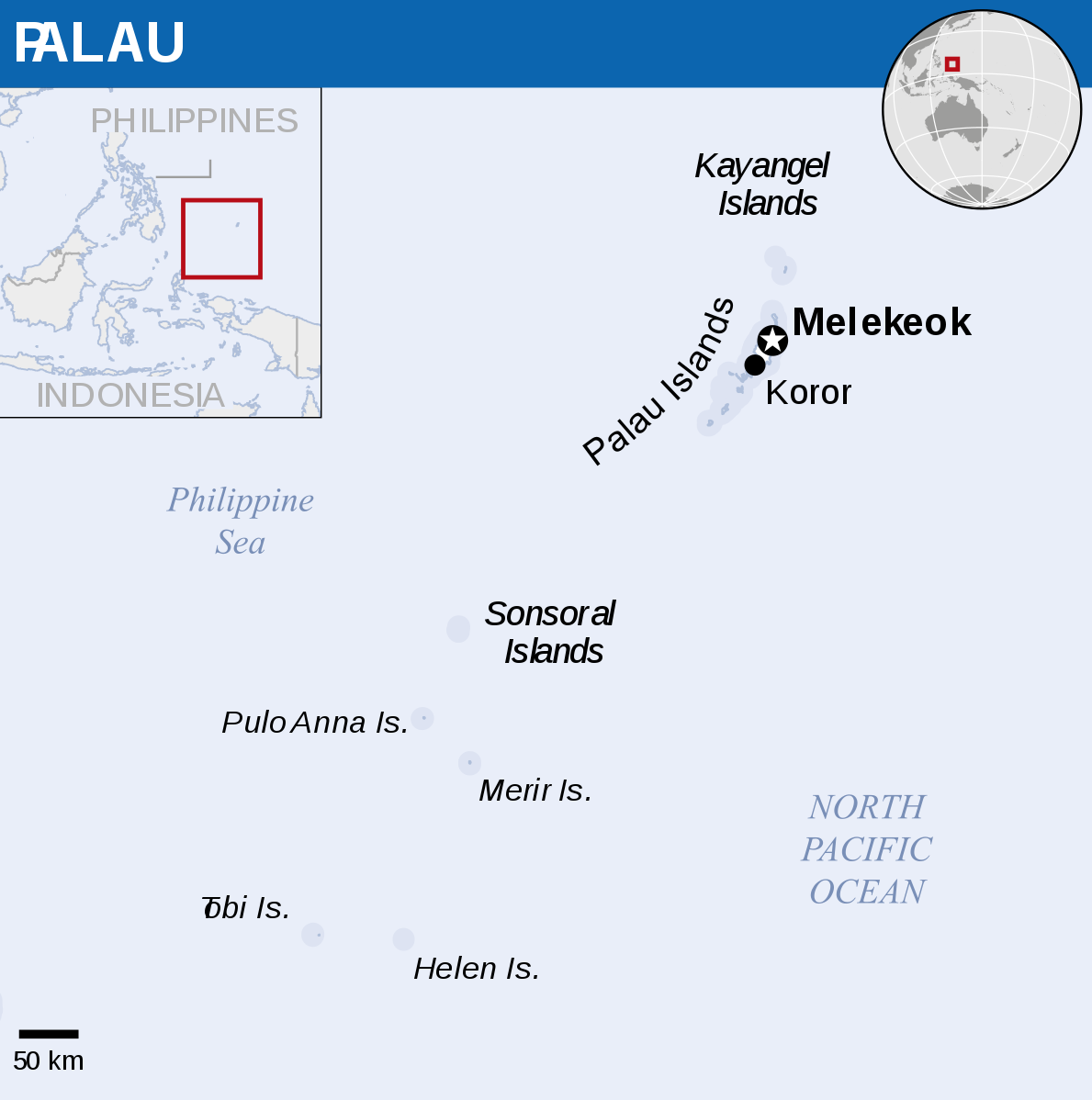
Palau
International Disaster Response Law in the Pacific
Overview

Legal Preparedness for International Assistance Assessment
1. Does Palau have a clear legal framework for disaster risk management which includes procedures relating to international disaster assistance?
The Disaster Risk Management Framework 2016 (which updates the 2010 Disaster Risk Management Framework) outlines the disaster risk management system in Palau. The 2016 Framework is given full effect by Executive Order No 397.
The Framework contains a section on International Assistance which outlines when a request for international assistance can be made and what that request should be based on. It also specifies that all requests for international assistance must first have the consent of the DEC and contains provisions around accountability for donor funds and a Presidential discretion to appeal directly to any foreign government.
2. Do Palau‘s laws and regulations clearly set out a focal point for coordinating international disaster assistance?
The Disaster Emergency Committee (DEC) is convened and chaired by the President and all Government Ministers are members of the DEC, whose role is to declare a national state of emergency, commit national resources for disaster management during a state of emergency, provide overall direction and strategic advice and request international assistance. The National Emergency Management Office (NEMO) provides secretariat support to the DEC. The National Emergency Committee (NEC) is convened by the Vice President and is comprised of several ministries, bureaus, divisions and agencies. Its role is to implement and monitor all aspects of the Framework including to request and coordinate use of external assistance. The NEC operates from the National Emergency Operations Center (NEOC) in accordance with established Standard Operating Procedures (SOPs) for each type of disaster. The NEMO is involved in all aspects of disaster management in Palau. NEMO acts in counsel and collaboration with the NEC. NEMO also performs day-to-day operations associated with disaster management and submits reports to the Vice President. The NEC is tasked with implementing and monitoring all aspects of the Framework, including requesting and coordinating the use of external assistance upon direction of the DEC.
3. Do Palau’s laws and regulations outline the roles and responsibilities of different institutions relating to international disaster assistance?
As mentioned above, the NDRMF outlines the responsibilities of the various agencies in requesting international assistance and in coordinating that assistance. The Framework goes on to say that regional and international partner and donor organisations, in consideration of providing support to Palau in any aspect of disaster risk management, are mandated to follow the structures and systems established under the Framework.
Once an official request for international assistance has been submitted, the Customs and Quarantine offices are to make the necessary arrangements for on-going clearance of all donor assistance provided for disaster relief purposes. The Customs and Quarantine offices are to consider approval of duty exemption for goods, which are purchased locally for the purpose of emergency and relief requirement. The approval of duty exemption will only be considered following a letter of request from the NEC. The terms of reference for the NEMO Coordinator also imposes a responsibility to assist the CCG and assessment teams in the compilation of survey reports to support requests for disaster assistance from international organisations and donor agencies.
4. Do Palau’s laws and regulations outline a process for requesting/welcoming offers of international disaster assistance, and for terminating international assistance?
The Framework dedicates a section to International Assistance and states that requests for international assistance will only be made when it has become clear that the situation at hand is beyond the national capabilities or when there are no national resources available from the Government, NGO or private agencies in Palau and with the approval of the DEC. The requests are made, on behalf of the Government of Palau, by the appropriate bureau under the Ministry of State, which typically will convene a meeting of diplomatic missions based in Palau as the first step in the process. The Chair of the NEC recommends to the DEC the need for international assistance based on assessment reports received. Activation of requests for assistance shall be liaised with the Ministry of State. However, the President, as Head of State, may make an appeal to any foreign government directly.
When international assistance requirements are made known, based on the information provided by damage and need assessment reports relayed to them by the Chair of NEC, the Ministry of State will conduct direct consultations with donors. All government agencies, NGOs, private and community organisations should assist in compilation of damage and need assessment reports. Priority needs will be based on the immediate danger to community survival and welfare. Under no circumstances will the Government or non-government agencies make direct requests to aid agencies/distribution or diplomatic missions on behalf of the Government of Palau without the consent of the DEC.
There appears to be no specific provisions for the termination of international assistance.
5. Do Palau’s laws and regulations provide for necessary legal facilities to be provided to international assisting actors?
As mentioned previously, the Framework sets out the customs and quarantine procedures for ongoing clearance of international relief assistance and the requirements around these procedures. Unfortunately, these appear to be the extent of legal facilities for international actors and there is no mention of other facilities such as waivers and exemptions, special visas or recognition of qualifications and licences.
6. Do Palau’s laws and regulations set out quality standards for international assisting actors?
The Framework mandates all regional and international partner and donor organisations who are considering providing support to Palau in disaster risk management to follow the structures and systems established under the Framework. However, it does not appear to set out quality standards for goods or services provided by international assisting actors.
7. Do Palau’s laws and regulations set out eligibility requirements for international assisting actors to receive legal facilities?
Palau’s disaster risk management legal frameworks do not appear to set out any eligibility requirements for international actors to receive legal facilities, aside from the provision mentioned above that any customs and quarantines exemptions be accompanied with a request from the NEC.
8. Do Palau’s laws and regulations establish a specialised unit for expediting the entry of international disaster assistance?
The Framework’s provision for Customs and Quarantine procedures for international disaster relief appear to be the only mechanism for facilitating ongoing customs clearance. Under this provision, the National Disaster Coordinator is responsible for providing information on donor assistance to Customs and Quarantine officers to facilitate the exemption process. It does not specify that this action will “expedite” the process, but it is clear that the intent is to enable the process to work quickly and efficiently. Customs authorities are required to “consider” duty exemption on goods purchased locally for the purposes of relief but only after a formal request from the NEC.
9. Do Palau’s laws and regulations provide adequate transparency, safeguards and accountability mechanisms governing international disaster relief and initial recovery assistance?
Under the heading of “International Assistance”, the Framework provides that the NEC and the CCG will also be accountable to the aid agencies/donors for ensuring that all relief assistance is distributed in accordance with guidelines governing the provision of such assistance and for the preparation of a report on expenditures and distribution of assistance provided by each agency/donor/diplomatic mission.
A further section on “Financial Considerations” in the Framework outlines that the Director of Bureau of National Treasury is responsible to the NEC for the management of all funds provided for disaster relief purposes, and prior authorisation (from the NEC) is needed for expenditure of such funds.
10. Do Palau’s laws and regulations outline procedures for international disaster assistance sent from and transiting through Palau?
Palau’s regulatory frameworks for disaster risk management do not appear to make provision for cases where international assistance is sent from Palau to another country, or for cases where international assistance transits through Palau territory.
Laws, policies, plans and other resources
-
The Constitution of the Republic of Palau
-
Executive Order No 397
-
Biosecurity Act 2014
-
Public Health, Safety and Welfare – Title 34
-
Super Typhoon Haiyan Emergency Funding Act, RPPL No. 9-16 2013
-
The National Power Plant Emergency Act, RPPL 8-34 2011
![]()

